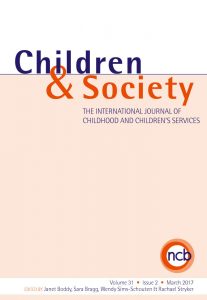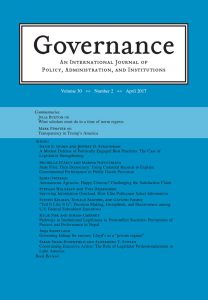Making it easier for authors to publish their research in a Wiley sociology or social welfare journal
by Lucy Towers · Published · Updated
 It is easy to understand why some authors dislike submitting manuscripts. If you have ever published your research in an academic journal, you may have submitted your paper to three or four journals before you finally found it a home. Searching for the right journal, reformatting your manuscript, and completing each submission process can take a lot of time and effort. Not to mention how long it might take for journal editors to find expert peer reviewers in the field.
It is easy to understand why some authors dislike submitting manuscripts. If you have ever published your research in an academic journal, you may have submitted your paper to three or four journals before you finally found it a home. Searching for the right journal, reformatting your manuscript, and completing each submission process can take a lot of time and effort. Not to mention how long it might take for journal editors to find expert peer reviewers in the field.
We recently launched the Wiley Sociology and Social Welfare Transfer Network to alleviate some of these frustrations and to improve the author experience in doing so. After months of hard work, the submission process should be as seamless as possible. Transfer networks can eliminate the need to search for suitable journals to submit to, reformat manuscripts, and go through peer review multiple times.
How does a transfer network work?
With this new approach to submission, editors can choose to refer papers that they believe are publishable, but may be out of scope for their journal, to other relevant journals. The transfer options are then presented to authors in the decision letter. If authors choose to accept the referral, they select which journal they would like to send their paper to (if more than one journal is listed) and the manuscript is automatically moved to the receiving journal’s submission system without having to reformat. Some submissions are even transferred with peer review reports, meaning editors of the journal receiving the referral may be able to make a quicker decision.
How can a transfer network help authors, editors and reviewers?
This workflow saves authors time and effort and may get their research published faster. Transfer networks are characterized by collaboration, and this cooperative approach also saves time for reviewers, as they will not need to duplicate the work already done by peer reviewers from the original journal. In short, referring and transferring is a real benefit for the entire community, as it makes for a smoother process from submission to publication across the board and ensures that good content is published quickly and efficiently.
What do journal editors value about the network?
We asked our Sociology and Social Welfare journal editors to share why they joined the network and how they see it benefitting researchers in Sociology and Social Welfare. Here’s what they had to say:
“Wiley’s transfer network has much potential to streamline publishing. Editors can provide advice and simple steps to assist authors in finding a suitable outlet for their work. Sharing peer reviews between journals is an intriguing innovation. It promises to save time for editors, reviewers, and authors — and without sacrificing quality, if handled with care.”
Scott Harris, PhD
Editor, Symbolic Interaction
“We are convinced that the Sociology transfer network is an important development for our research community within Sociologia Ruralis. Not only does it provide a more efficient peer review process, but it also results in a better author experience overall.”
Dr Ruth McAreavey
Co-Editor, Sociologia Ruralis
“What I appreciate the most about the transfer network is efficiency without compromising quality, that is: reviewers’ time is protected in this process by transferring their comments to the transfer network.”
Wen-Jui Han, PhD
Co-Editor-in-Chief, International Journal of Social Welfare
“The co-editors of Sociological Inquiry believe that this new transfer network will create a chance for journals to receive a variety of interesting submissions, as well as assist in making sure manuscripts better fit into journals of interest.”
Cameron Lippard, PhD and J. Scott Carter, PhD
Co-Editors-in-Chief, Sociological Inquiry
The Sociology and Social Welfare transfer network comprises 17 titles, all dedicated to improving the author experience and making the peer review process more efficient. The participating titles span a wide range of research focuses, including rurality, health and illness, social work and interactionism, with some titles that cover the field of sociology more generally.
The full list of titles can be seen below:
- Brain & Behavior
- British Journal of Sociology
- Canadian Review of Sociology
- Child & Family Social Work
- Child: Care, Health & Development
- Children & Society
- Health & Social Care in the Community
- Health Science Reports
- International Journal of Social Welfare
- Journal for Theory of Social Behaviour
- Personality & Mental Health
- Rural Sociology
- Sociologia Ruralis
- Sociological Inquiry
- Sociology of Health & Illness
- Stress & Health
- Symbolic Interaction
Ultimately, a good paper is a good paper, and it deserves to be published and to make a contribution to the field. Whether it be a novel discovery or a validation of existing research in the form of a new study, the paper has a place in the research community and will be guided through the transfer network accordingly, until it ends up where it belongs.
Have you published via a transfer network?
We’d love to hear more about your experiences. Share your feedback on Twitter and tag @SociologyLens.






1099-1328/asset/dsa_logo.jpg?v=1&s=e4815e0ca3064f294ac2e8e6d95918f84e0888dd)